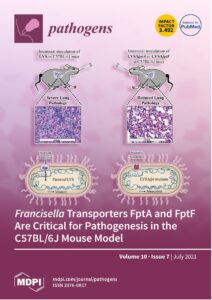
Brandi Hobbs, Ph.D. (COM-Erie)
Background
Brandi E. Hobbs, Ph.D. completed her Bachelor of Science in Biology at Edinboro University of Pennsylvania and her doctorate in Molecular Microbiology and Immunology at The University of Maryland, School of Medicine at the Center for Vaccine Development and Global Health. Her research focused on host-pathogen interactions and vaccine development against the Select Agent of concern for biodefense Francisella tularensis. She characterized live attenuated Francisella Phagosomal Transporter (fpt) deletion mutants in vitro and in vivo to understand the roles of Fpt gene products in the pathogenesis of Francisella tularensis and to evaluate their efficacy as targets for the development of vaccines. Furthermore, she provided Francisella tularensis expertise to a collaboration investigating vector-born microbial transmission by tick nanovesicles. One of the vectors for transmission of Francisella tularensis is the Dermacentor tick (American dog tick) which contains arthropod salivary effectors, or nanovesicles, that assist in vector feeding by altering mammalian immune homeostasis specifically in the skin. Dr. Hobbs also gained valuable, hands-on training in Global Health as an awardee of a Global Grant from the Center for Global Engagement at the University of Maryland, Baltimore through which she worked closely on an interprofessional project with The Gambian Ministry of Health and the University of The Gambia to address COVID-19-related occupational health concerns.
Research Interests
Microbial Pathogenesis, Host-Pathogen Interactions, Vaccine Development, Global Health
Recent Publications and Presentations
- Hobbs, B.E., Matson, C.A., Theofilou, V.I., Webb, T.J., Younis, R.H., Barry, E.M. Deletion Mutants of Francisella Phagosomal Transporters FptA and FptF are Highly Attenuated for Virulence and are Protective Against Lethal Intranasal Francisella LVS Challenge in a Murine Model of Respiratory Tularemia. Pathogens, 2021. 10(7): p. 799. Pubmed.
- Dissertation work was selected to be featured as the cover of a Special Issue of
- Chávez, A.S.O., Wang, X., Archer, N., Hammond, H.L., McClure Carroll, E.E., Shaw, D.K., Buskirk, A.D., Ford, S.L. Morozova, K., Clement, C.C., Lawres, L., O’Neal, A.J., Mamoun, C.B., Mason, K.L., Hobbs, B.E., Scoles, G.A., Barry, E.M., Sonenshine, D.E., Pal, U., Valenzuela, J.G., Sztein, M.B., Pasetti, M.F., Levin, M.L. Kotsyfakis, M., Jay, S.M., Miller, L., Santambrogio, L., Pedra J.H.F. Tick Extracellular Vesicles Enable Arthropod Feeding and Promote Distinct Outcomes of Bacterial Infection. Nature Communications, 12(1): p. 3696. Pubmed.
- Conference Presentation: Francisella tularensis Phagosomal Transporters fptA and fptF are Critical for Pathogenesis. Hobbs, B., Barry, E.M., ASM Biothreats 2020, Arlington, VA, January 2020.

